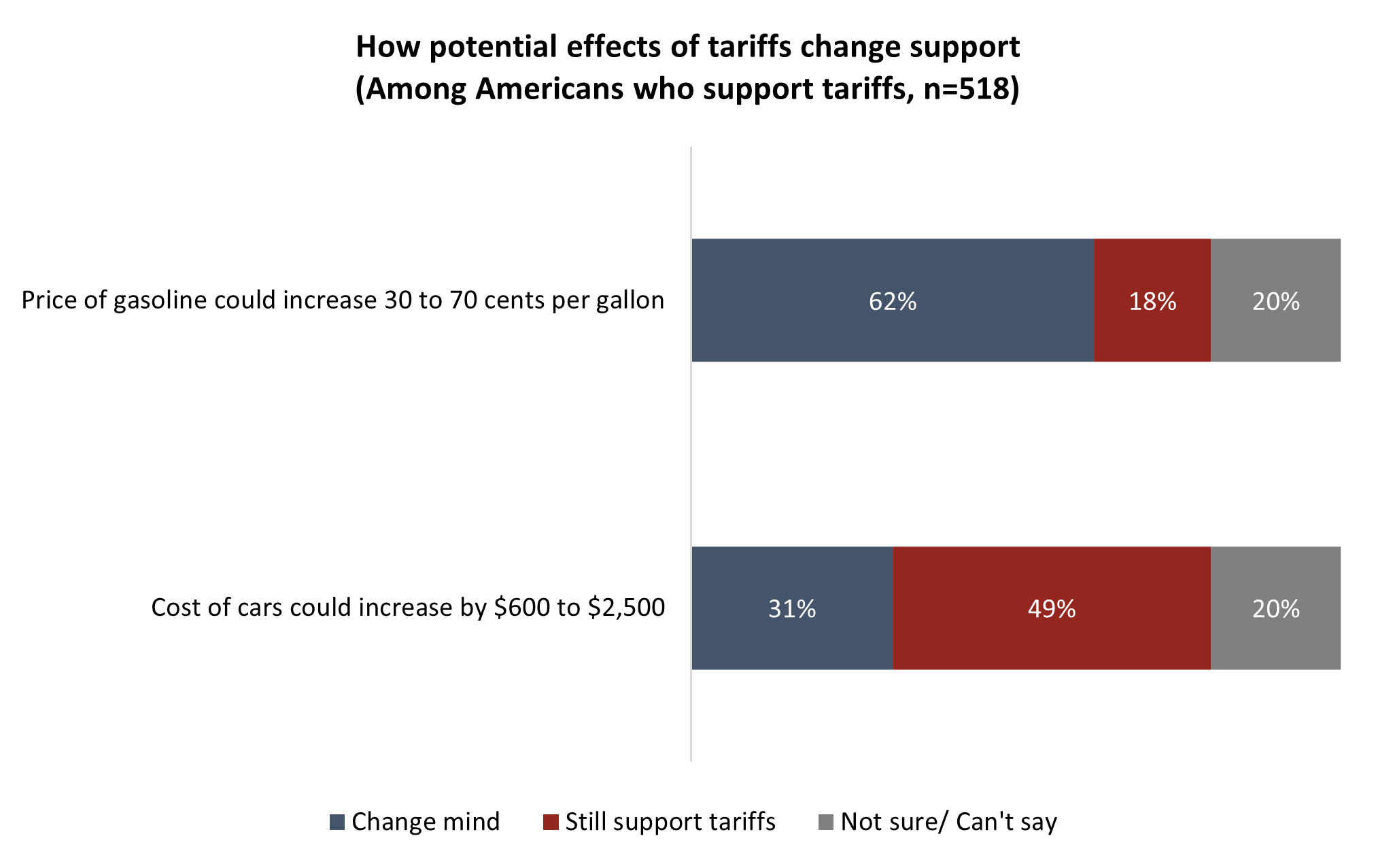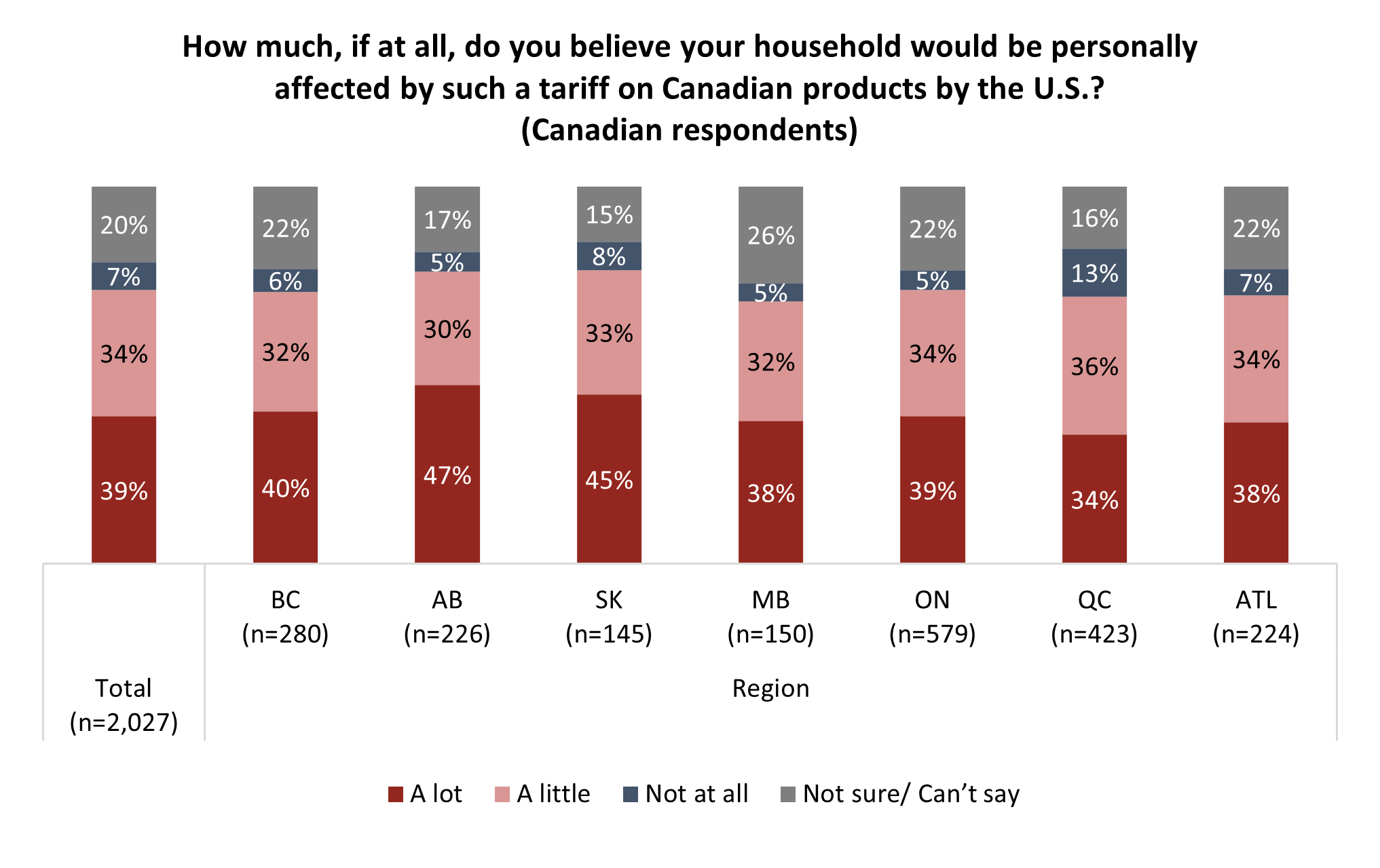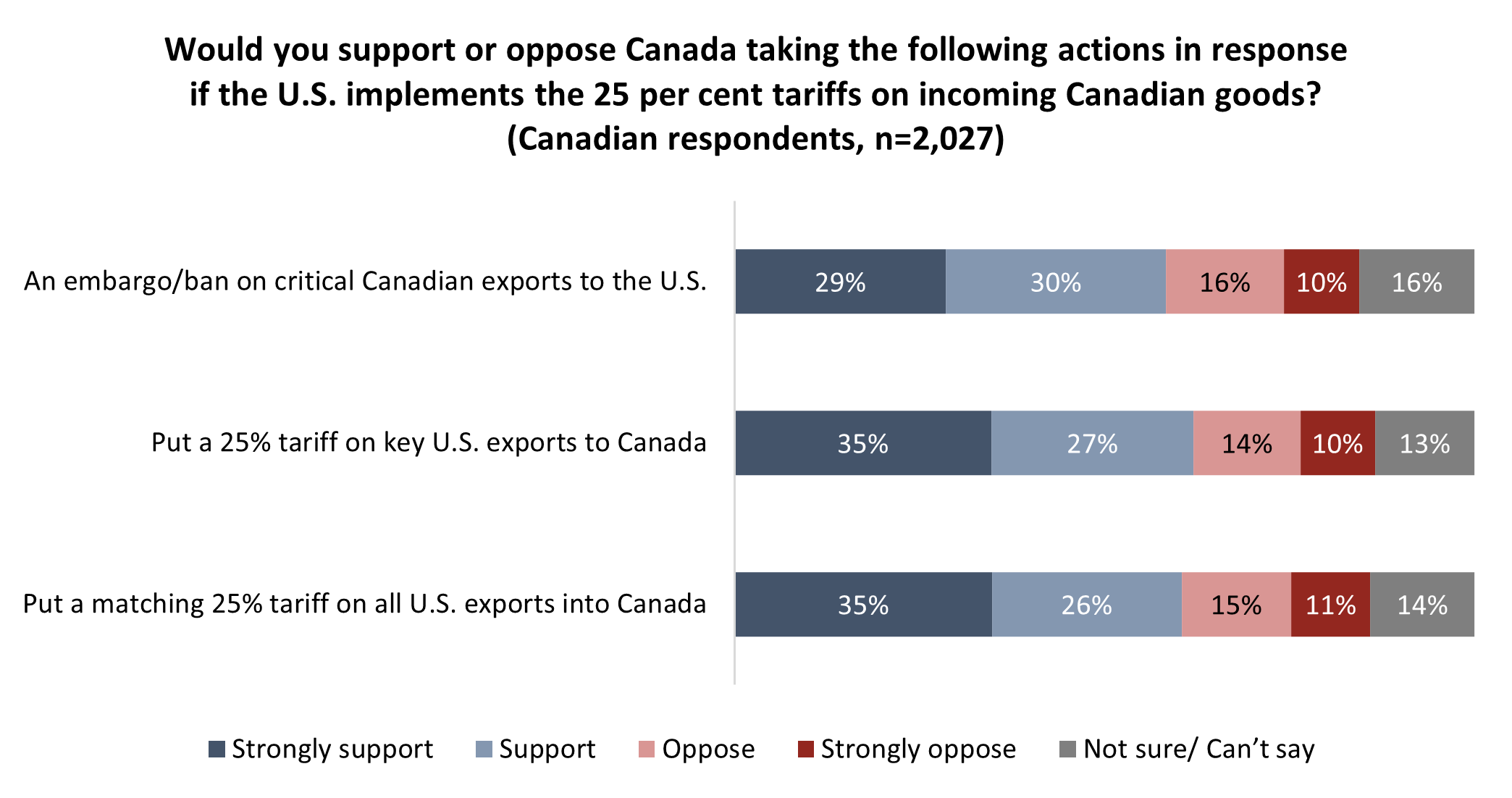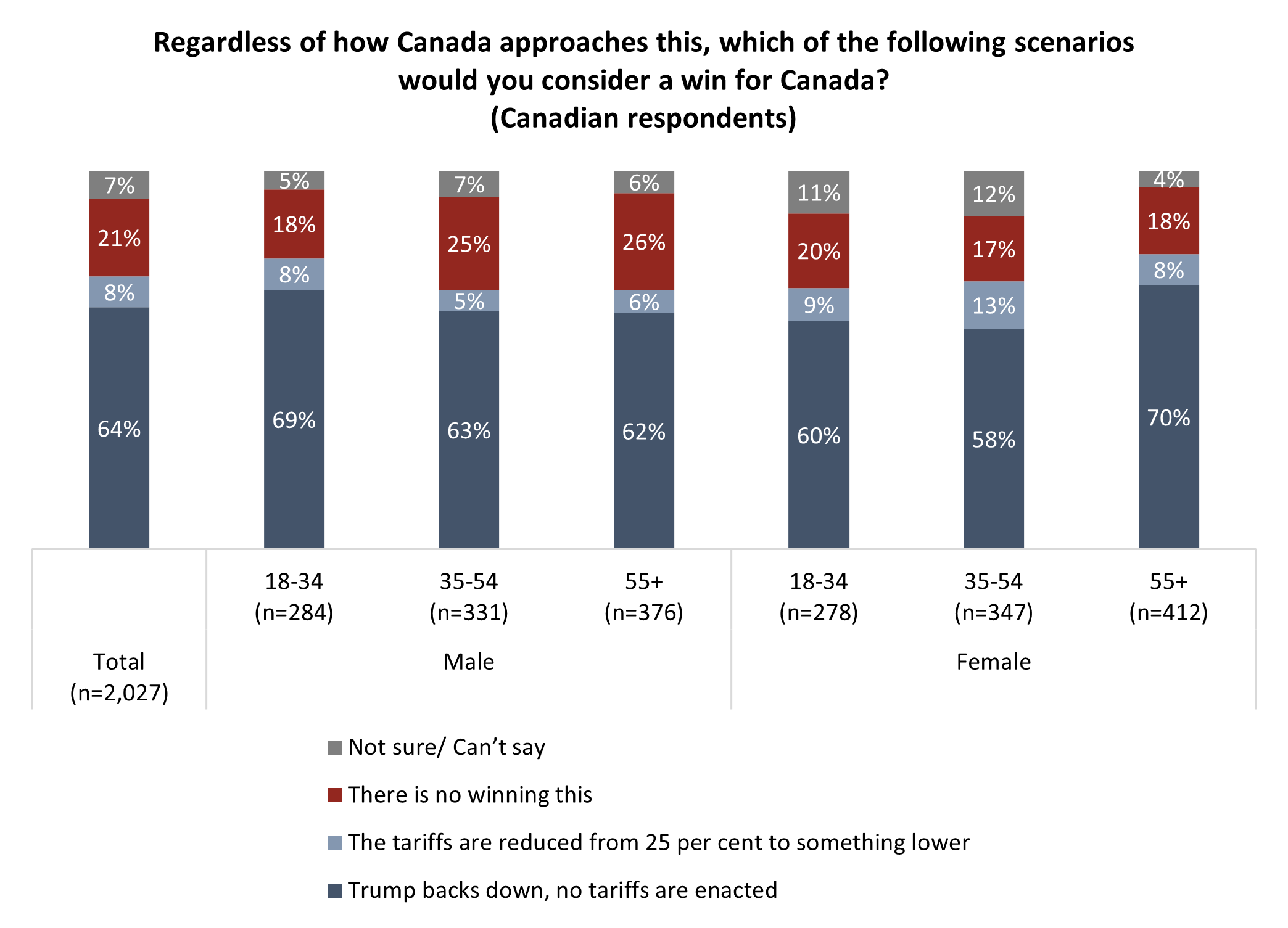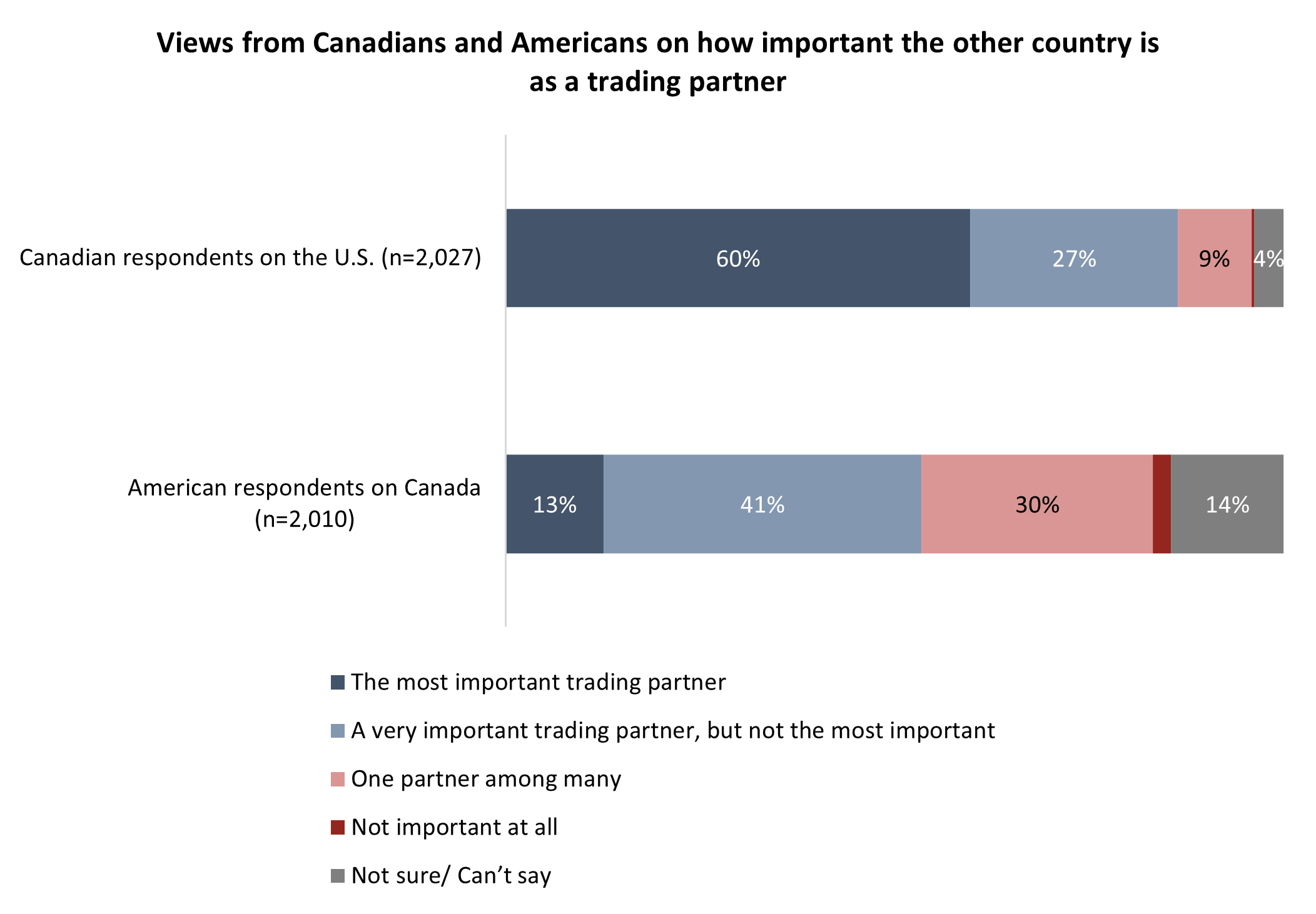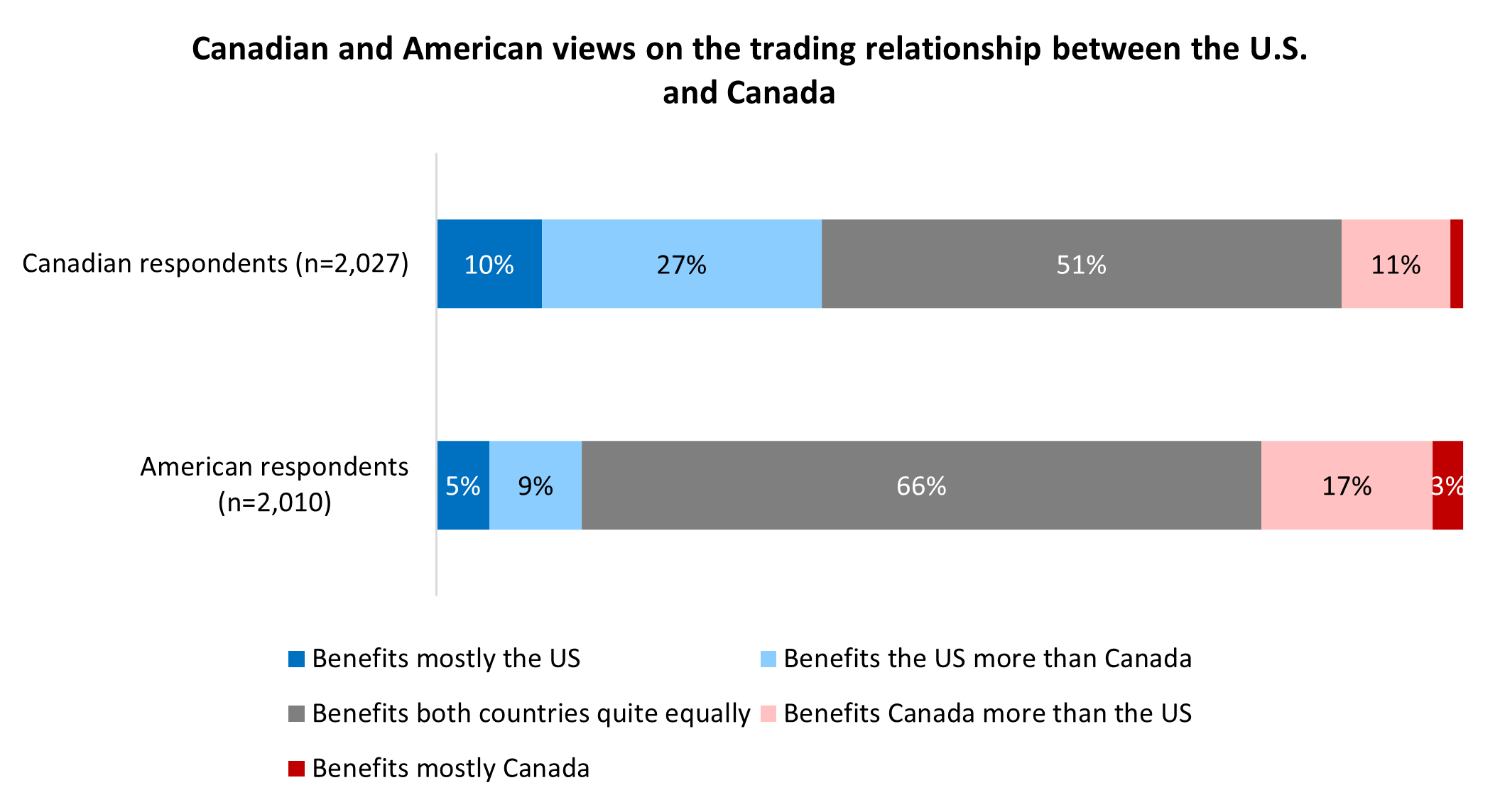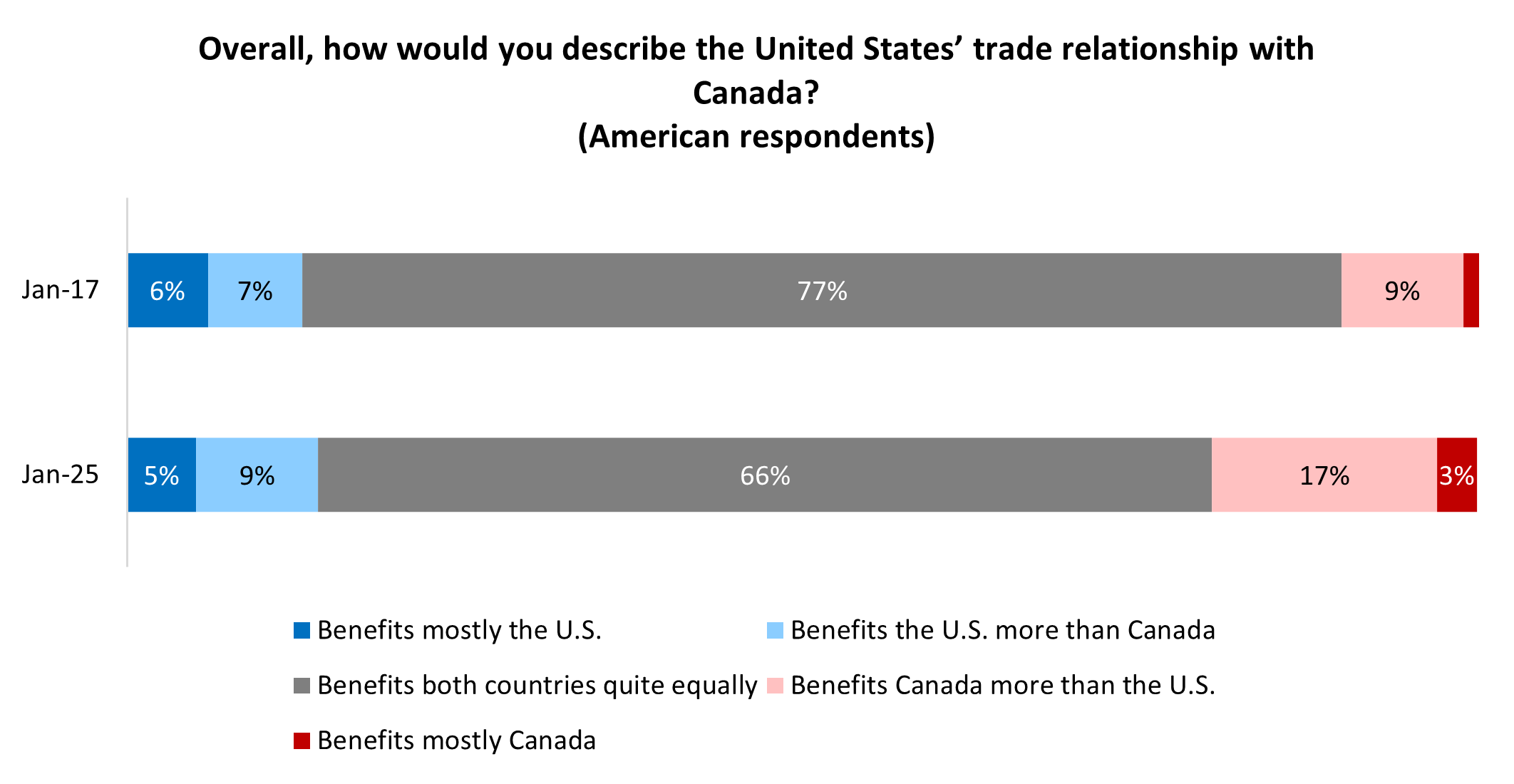Three-in-five Canadians support retaliatory tariffs, ban on critical exports if Trump threat materializes
January 16, 2025 – When President-elect Donald Trump takes office on Jan. 20, all eyes in this country will be watching to see how he follows through on his decision not to apply a threatened 25-per-cent tariff on Canadian goods entering the United States.
New data from the non-profit Angus Reid Institute finds that among Americans and Canadians alike, the hope is that Trump is all talk.
In the U.S., one-quarter (26%) support the 25-per-cent tariff on Canada, while twice as many (50%) oppose it. Among Trump supporters, this idea is initially popular, with 53 per cent support and 19 per cent opposition. That said, when considering the potential impacts to American consumers of the price of U.S. goods, enthusiasm dissipates.
Among those Trump voters, half (49%) change their mind, and instead oppose the tariffs when they are informed that some projections are that gas could rise 30 to 70 cents per gallon, given America’s current level of import of Canadian oil.
For Canadians, much of the conversation has turned to their own government’s response. With the Liberal Party searching for a new leader, many are wondering who will lead the effort against Trump once parliament sits again in March. When it does, Canadians support assertive action in the face of Trump’s threats. Three-in-five say that if Trump does impose tariffs, Canada should do the same. A similar number would support a blanket 25 per cent on all American goods, or a targeted set of tariffs at that level on critical exports.
That isn’t to say that Canadians aren’t aware of the potential damage this burgeoning trade conflict could cause. Two-in-five (39%) say that their household would face significant harm if tariffs were enacted by Trump, while another one-in-three (34%) expect to feel the impact, but less so.
More Key Findings:
- 60 per cent of Canadians say the U.S. is the countries most important trading partner. Just 13 per cent of Americans say the same of Canada.
- That said, two-thirds of U.S. respondents say that the trade relationship between the two countries benefits each close to equally. Half in Canada say this, while 37 per cent say the U.S. derives more benefit from trade
- Asked what they consider “victory” in this trade conflict with Trump, 64 per cent of Canadians say no tariffs at all. Eight per cent say lower levels of tariffs would be a win, while one-in-five say there is no winning.
About ARI
The Angus Reid Institute (ARI) was founded in October 2014 by pollster and sociologist, Dr. Angus Reid. ARI is a national, not-for-profit, non-partisan public opinion research foundation established to advance education by commissioning, conducting and disseminating to the public accessible and impartial statistical data, research and policy analysis on economics, political science, philanthropy, public administration, domestic and international affairs and other socio-economic issues of importance to Canada and its world.
INDEX
Part One: American largely oppose Trump tariffs
- Price of gas pain point for Americans
Part Two: How should Canada respond?
- Plurality expect tariffs to impact household ‘a lot’
- Broad support for retaliatory tariffs & embargos on exports
- Two-thirds say Canada wins if Trump backs down
Part Three: Gauging the relationship from both sides of the border
- Big gap between Canadians and Americans on who is ‘most important’ trading partner
- Cross-border majorities say U.S.-Canada trade benefits both countries
- American perspectives 2017 vs. now
Part One: American largely oppose Trump tariffs
As the days countdown to the inauguration of President-elect Donald Trump, Canadians have turned a worrying eye southward as they consider the threat of the returning Republican’s tariffs. Americans have a lot on their plate – fires in California, confirmations of key players of Trump’s cabinet, a pending ban on social media app TikTok – which is perhaps diverting their focus from trade concerns. On the related issue of Trump looking to force Canada to join the United States, one-third (35%) told the Angus Reid Institute they were following that story closely, while more are disengaged.
Disengagement from cross-border concerns does not guarantee tacit approval. Americans oppose the tariffs by a two-to-one (50% to 26%) ratio. In October, during the election campaign, the response was similar – 10 per cent said the U.S. should impose a “major” tariff on Canada, 25 per cent said it should be “minor” while 42 per cent believed there shouldn’t be a tariff at all.
Related: Trump’s Tariffs: Americans favour large tariffs on China, less convinced Canada should be a target
As was also the case in October, the bulk of support for the tariffs come from those who voted Trump in the 2024 election – 53 per cent of whom support the 25-per-cent tax on Canadian imports. Those who supported the Democratic candidate Kamala Harris are instead most likely to be strongly opposed (71%):
Price of gas pain point for Americans
More than 50 per cent of crude oil imports into the U.S. come from Canada. The tariffs will impact gasoline prices in the U.S., with some expecting an increase of up to 70 cents per gallon once the full tariffs are imposed. Bloomberg reported this week that the Trump administration could gradually hike tariffs by two to five per cent per month rather than implement them all at once to avoid price spikes.
Regardless of how the tariffs are implemented, Americans appear less likely to support them if they result in pain at the pump. Three-in-five (62%) of those who supported the tariffs say they would change their mind if the price of gasoline increased by 30 to 70 cents per gallon.
Because of the integration of automobile manufacturing across the border, experts also say the price of cars in the U.S. could increase by $600 to $2,500 per car. However, that appears to be less of a factor in changing American minds:
Part Two: How should Canada respond?
The response from Canadian political leaders has been anything but unified. Prime Minister Justin Trudeau travelled to Mar-a-Lago to discuss the issue in the weeks after the November election, but came away without having changed Trump’s tact. Premiers Doug Ford and Danielle Smith of Ontario and Alberta respectively have become regular guests on American news programs to argue against the tariffs, while the latter also made the trip to the “Winter White House” to – unsuccessfully – win concessions for Alberta’s oil and gas sector.
Meanwhile, the federal government has not revealed how it plans to counter the tariffs. Foreign Affairs Minister Mélanie Joly told CTV’s Question Period that “everything is on the table”, including restricting energy exports. It has also been reported the government is considering retaliatory tariffs on select American goods including Florida orange juice, ceramics, and steel. Ford, for his part, has said his province is considering restricting electricity exports.
Plurality expect tariffs to impact household ‘a lot’
The Conference Board of Canada expects the macro effect of the tariffs to be a 2.6 per cent decline in Canada’s GDP, the equivalent of $78 billion CAD or $1,900 per Canadian. At the household level, few (7%) Canadians believe their household won’t be impacted. Instead, a plurality of two-in-five (39%) believe they will be affected “a lot” while one-third (34%) believe the impact will be smaller.
Across the country, Albertans (47%) and those in Saskatchewan (45%) are most likely to believe their household will be greatly impacted by 25-per-cent tariffs. In 2023, Alberta accounted for 28.5 per cent of all exports to the U.S. from Canada by dollar value, behind only Ontario 37.5 per cent. The bulk of Albertan exports were oil and gas. According to RBC, exports to the U.S. accounted for 34 per cent of provincial GDP in Alberta and 25 per cent of provincial GDP in Saskatchewan.
Broad support for retaliatory tariffs & embargos on exports
It remains to be seen what the first return salvo from Canada will be in this trade war, but Canadians support a broad range of measures including a narrow set of tariffs on key U.S. exports to Canada (62% support), 25-per-cent tariffs on all U.S. exports (61% support) and a full cessation of trade on certain goods (59%).
Across the board, support is lower for all measures in Alberta and Quebec. Notably on the latter measure, which would potentially include an embargo of Canadian oil exports, one-third (36%) of Albertans are opposed, the most in the country (see detailed tables).
Two-thirds say Canada wins if Trump backs down
The trade war has yet to be fought, but most Canadians have a clear view of victory – 64 per cent say Canada only comes out ahead if Trump backs down completely and there are no tariffs. Few (8%) accept a reduction of tariffs as a “win” for their country. One-in-five (21%) are more circumspect, saying there is “no winning this”.
Part Three: Gauging the relationship from both sides of the border
Big gap between Canadians and Americans on who is ‘most important’ trading partner
Combining exports and imports, Canada is typically the U.S.’s top trading partner, although China and Mexico are not far behind. The U.S. is far and away Canada’s top trading partner by both imports and exports. This perhaps explains the discrepancy between residents of the two countries as they are asked to assess the relationship. Three-in-five (60%) Canadians say the U.S. is their country’s “most important” trading partner; one-in-eight (13%) Americans say the same of Canada. Instead, Americans are more likely to describe the relationship as “very important, but not the most important” (41%) or something less than that (30%):
Cross-border majorities say U.S.-Canada trade benefits both countries
The broad sentiment in both Canada and the United States is that this massive trade relationship confers mutual benefit. In Canada, half (51%) say that both countries benefit close to equally, while in the U.S. two-thirds (66%) feel this way. That said, Canadians are more likely to feel that their U.S. counterparts derive more benefit than the other way around:
American perspectives 2017 vs. now
Trump’s rhetoric about the unfair relationship between Canada and his country, and general America First messaging, may be impacting how Americans view the two countries. The proportion of Americans saying Canada benefits more than the U.S. has doubled from 11 per cent to 20 per cent since 2017:
METHODOLOGY:
The Angus Reid Institute conducted an online survey from Jan. 10-13, 2025, among a representative randomized sample of 2,027 Canadian adults who are members of Angus Reid Forum. For comparison purposes only, a probability sample of this size would carry a margin of error of +/- 1.5 percentage points, 19 times out of 20.
ARI conducted a second online survey from Jan. 10-13, 2025, among a representative randomized sample of 2,010 American adults who are members of Angus Reid Forum USA. For comparison purposes only, a probability sample of this size would carry a margin of error of +/- 1.5 percentage points, 19 times out of 20.
Discrepancies in or between totals are due to rounding. Both surveys were self-commissioned and paid for by ARI. Detailed tables are found at the end of this release.
For detailed results for Canadian respondents by age, gender, region, education, and other demographics, click here.
For detailed results for American respondents by age, gender, region, education, and other demographics, click here.
For full release, click here.
For questionnaire, click here.
MEDIA CONTACT:
Shachi Kurl, President: 604.908.1693 [email protected] @shachikurl
Dave Korzinski, Research Director: 250.899.0821 [email protected]
Jon Roe, Research Associate: 825.437.1147 [email protected]
This post was originally published on here


